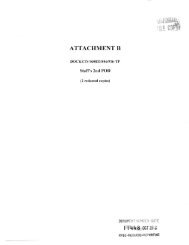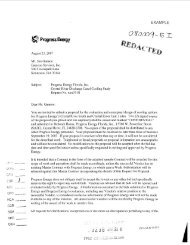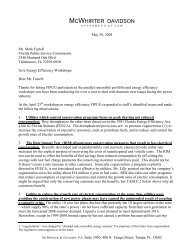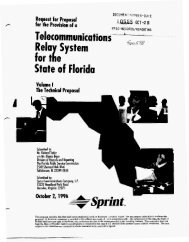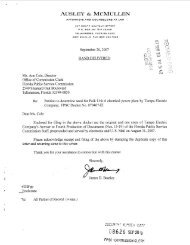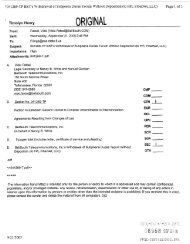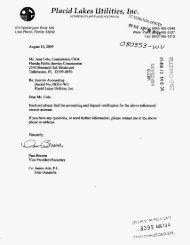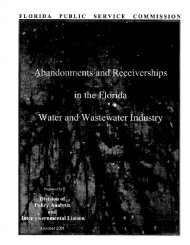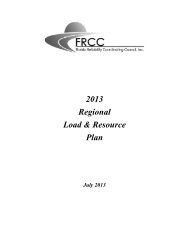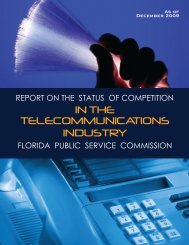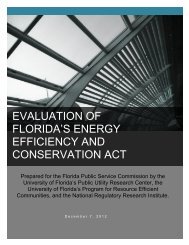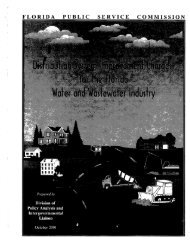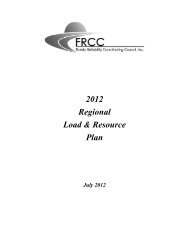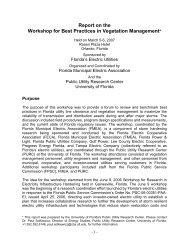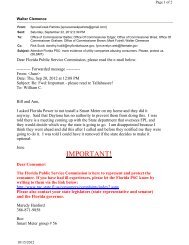Review of 2008 Ten-Year Site Plans - Public Service Commission
Review of 2008 Ten-Year Site Plans - Public Service Commission
Review of 2008 Ten-Year Site Plans - Public Service Commission
Create successful ePaper yourself
Turn your PDF publications into a flip-book with our unique Google optimized e-Paper software.
6. TRANSMISSION PLANS<br />
As generation capacities increase, the transmission system must grow accordingly to maintain<br />
the capability <strong>of</strong> delivering the energy to the end user. The <strong>Commission</strong> has been given broad<br />
authority under certain sections <strong>of</strong> Chapter 366, F.S., known as the Grid Bill, to require reliability<br />
within Florida’s coordinated electric grid and to ensure the planning, development, and maintenance<br />
<strong>of</strong> adequate generation, transmission, and distribution facilities within the state.<br />
Reliability Standards<br />
Nationwide, electric utilities plan their bulk power systems (100 kV and above) to comply<br />
with the NERC and regional reliability standards. The NERC's mission is to ensure that the bulk<br />
electric system in North America is reliable, adequate, and secure. Since its formation in 1968, the<br />
NERC operated successfully as a self-regulatory organization, and the electric industry voluntarily<br />
complied with the NERC’s reliability standards. Changes in the electric industry, however, have<br />
rendered the voluntary compliance system inadequate. In response to these industry changes,<br />
Congress required the Federal Energy Regulatory <strong>Commission</strong> (FERC) to develop a new mandatory<br />
system <strong>of</strong> reliability standards and compliance. The Energy Policy Act <strong>of</strong> 2005 authorized the<br />
creation <strong>of</strong> an electric reliability organization (ERO) with the statutory authority to enforce<br />
compliance with reliability standards among all market participants. The NERC received certification<br />
as the ERO from the FERC in July 2006.<br />
NERC works with all stakeholder segments <strong>of</strong> the electric industry, including electricity users,<br />
to develop standards for the reliable planning and operation <strong>of</strong> the bulk power systems.<br />
Fundamentally, a power system should always operate in such a way that no credible contingency<br />
could trigger cascading outages or another form <strong>of</strong> instability. Reliability standards are generally<br />
applied as follows:<br />
• Under a single-contingency criterion, a utility’s transmission system experiences no<br />
equipment overloads, voltage violations, or instability following a contingency outage <strong>of</strong> the<br />
single most crucial element, whether that piece <strong>of</strong> equipment is a generator, a transmission<br />
line, or a transformer. The single-contingency criterion is generally the minimum reliability<br />
standard at which electric utilities plan their bulk power systems.<br />
• Under a multiple-contingency criterion, a utility’s transmission system must withstand the<br />
simultaneous failure <strong>of</strong> two or more elements with a controlled loss <strong>of</strong> load and no cascading<br />
outages which affect neighboring utilities. The transmission system must subsequently be<br />
able to adjust so that all elements operate within their emergency ratings for the duration <strong>of</strong> the<br />
outage.<br />
In response to congressional actions to require mandatory reliability standards, which were<br />
supported by the <strong>Commission</strong>, the Florida Reliability Coordinating Council (FRCC) has implemented<br />
a compliance program that will monitor and enforce compliance with the NERC and the FRCC<br />
reliability standards. The program relies on self-assessment, periodic reporting, and on-site audits for<br />
compliance. In administering the compliance program, the FRCC works closely with all owners,<br />
operators, and users <strong>of</strong> the state’s bulk electric system. The <strong>Commission</strong> staff attends FRCC meetings<br />
<strong>Review</strong> <strong>of</strong> <strong>2008</strong> <strong>Ten</strong>-<strong>Year</strong> <strong>Site</strong> <strong>Plans</strong> - 35 -



